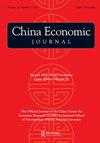Market expectation management and renminbi exchange rate policy under depreciation pressure
IF 2.3
Q1 ECONOMICS
引用次数: 0
Abstract
ABSTRACT Motivated by the capital outflow episode after the 8/11 renminbi exchange rate reform, we establish formal models to study renminbi exchange rate policy under depreciation pressure with a focus on its effect on market expectations. In an economy where capital controls are imposed, a central bank aims both to discourage speculative capital outflows and to reduce exchange rate misalignment. We find that (i) both capital controls and speculators’ uncertainty about the central bank’s exchange rate target can effectively discourage capital outflows; (ii) Any action taken by the central bank will send a signal to speculators about the central bank’s exchange rate target, causing a change in speculators’ expectations and subsequently in capital flows. This explains large capital outflows triggered by the 8/11 reform. A key takeaway is that exchange rate policy should take into account its effect on market expectations to avoid unnecessary exchange rate and capital flow volatility.贬值压力下的市场预期管理与人民币汇率政策
摘要受8·11人民币汇率改革后资本外流事件的影响,我们建立了正式的模型来研究贬值压力下的人民币汇率政策,重点研究其对市场预期的影响。在一个实行资本管制的经济体中,央行的目标既是阻止投机资本外流,又是减少汇率失调。我们发现(i)资本管制和投机者对央行汇率目标的不确定性都可以有效地抑制资本外流;(ii)央行采取的任何行动都会向投机者发出关于央行汇率目标的信号,导致投机者的预期发生变化,随后资本流动也会发生变化。这就解释了“8·11”改革引发的大量资本外流。一个关键的结论是,汇率政策应该考虑到它对市场预期的影响,以避免不必要的汇率和资本流动波动。
本文章由计算机程序翻译,如有差异,请以英文原文为准。
求助全文
约1分钟内获得全文
求助全文

 求助内容:
求助内容: 应助结果提醒方式:
应助结果提醒方式:


